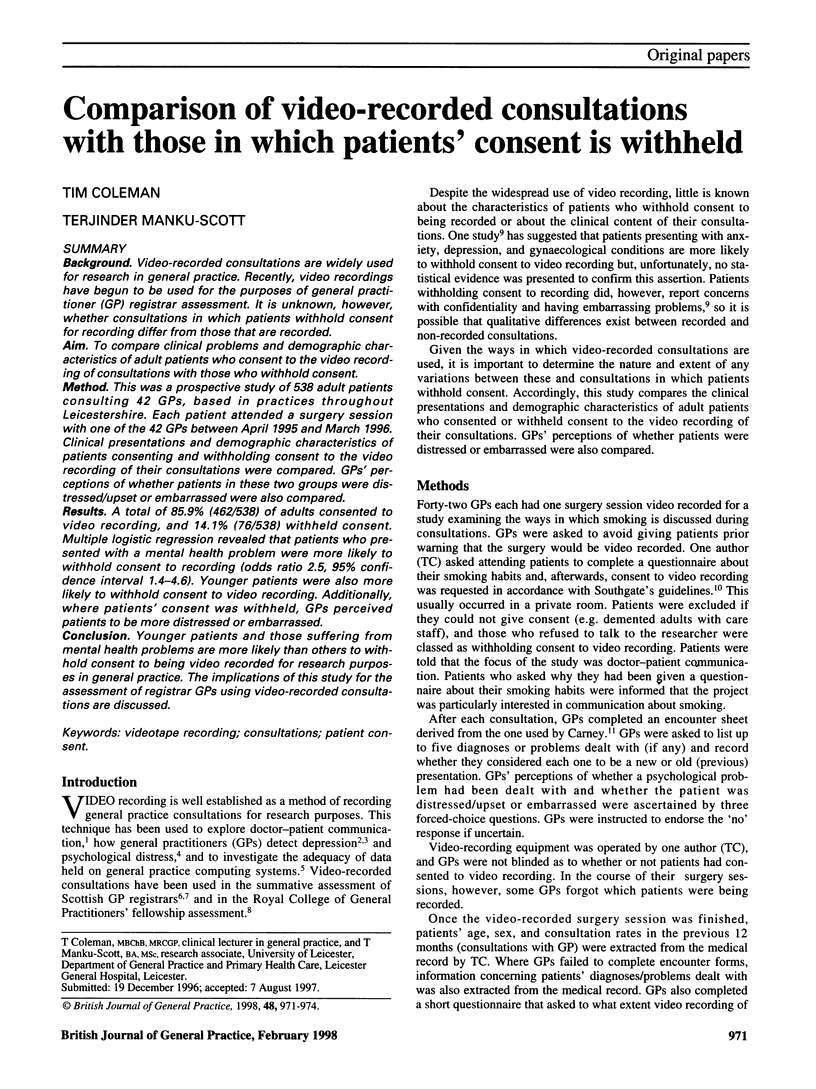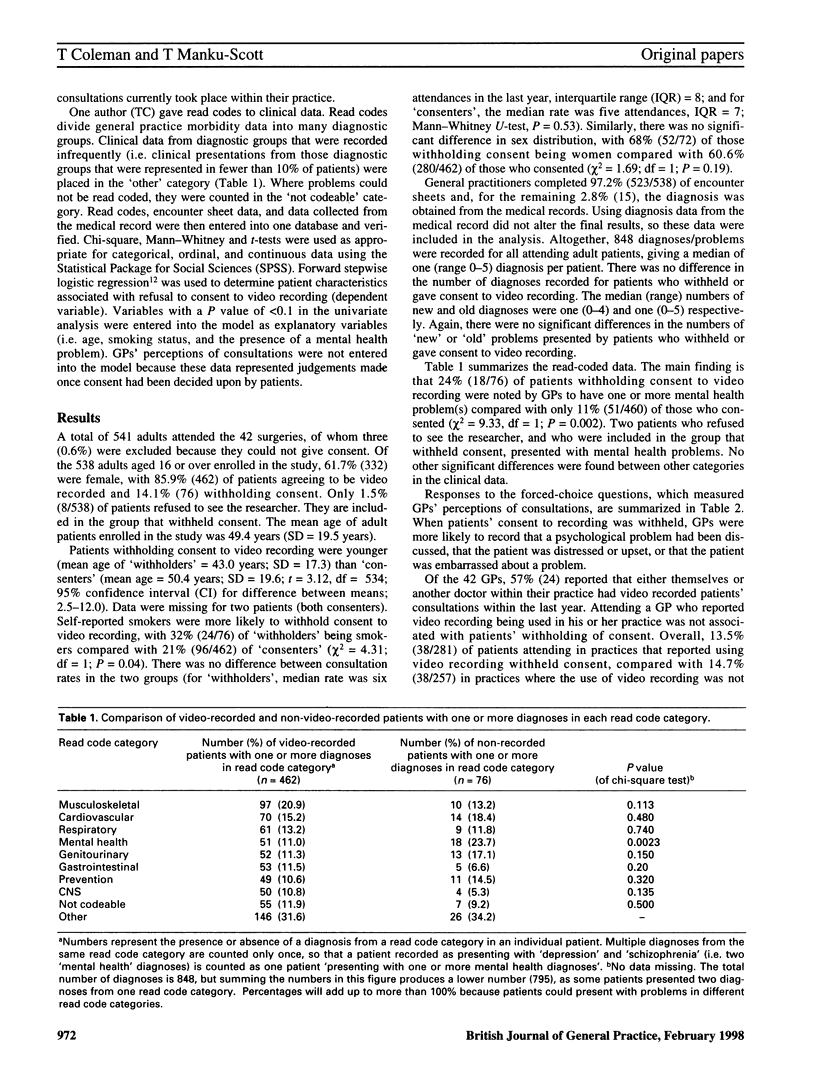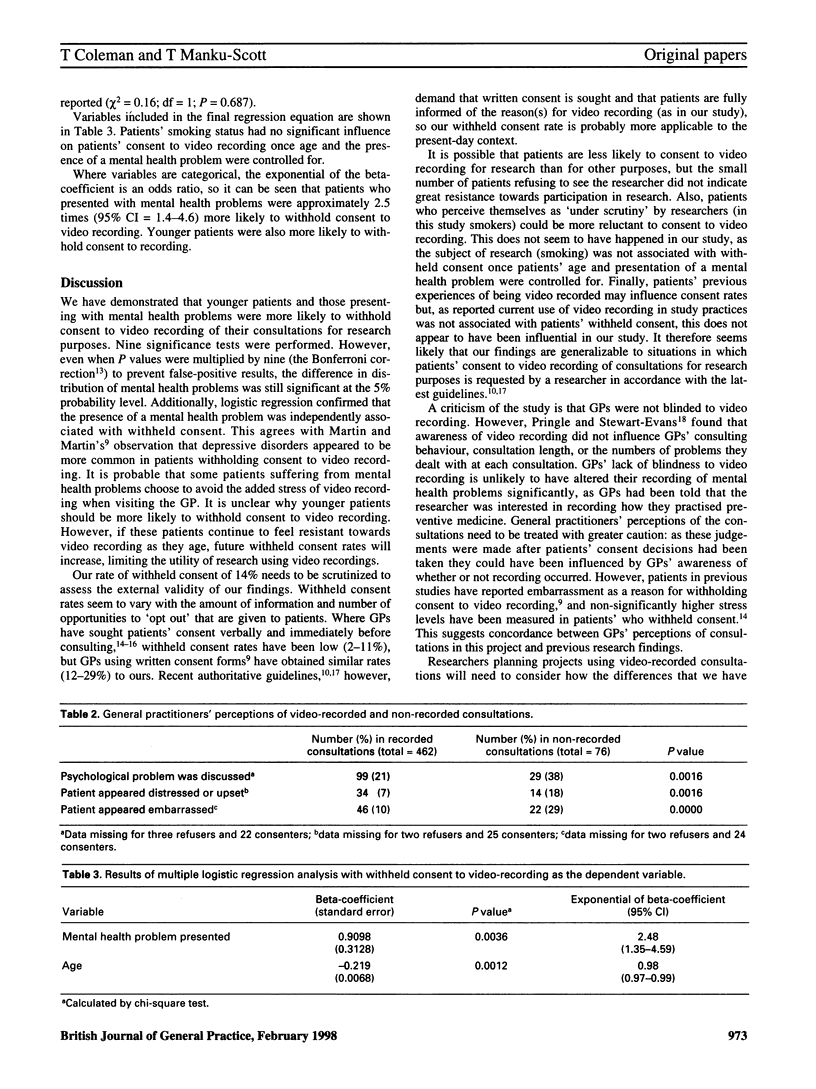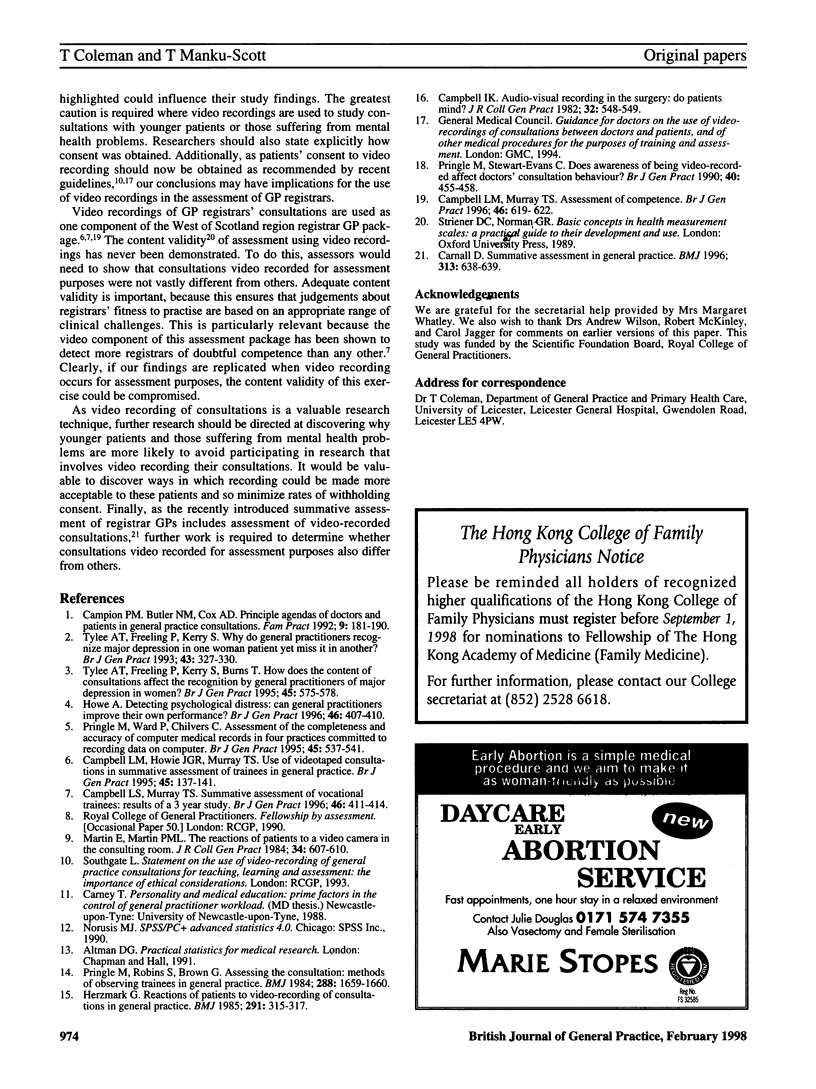Abstract
BACKGROUND: Video-recorded consultations are widely used for research in general practice. Recently, video recordings have begun to be used for the purposes of general practitioner (GP) registrar assessment. It is unknown, however, whether consultations in which patients withhold consent for recording differ from those that are recorded. AIM: To compare clinical problems and demographic characteristics of adult patients who consent to the video recording of consultations with those who withhold consent. METHOD: This was prospective study of 538 adult patients consulting 42 GPs, based in practices throughout Leicestershire. Each patient attended a surgery session with one of the 42 GPs between April 1995 and March 1996. Clinical presentations and demographic characteristics of patients consenting and withholding consent to the video recording of their consultations were compared. GPs' perceptions of whether patients in these two groups were distressed/upset or embarrassed were also compared. RESULTS: A total of 85.9% (462/538) of adults consented to video recording, and 14.1% (76/538) withheld consent. Multiple logistic regression revealed that patients who presented with a mental health problem were more likely to withhold consent to recording (odds ratio 2.5, 95% confidence interval 1.4-4.6). Younger patients were also more likely to withhold consent to video recording. Additionally, where patients' consent was withheld, GPs perceived patients to be more distressed or embarrassed. CONCLUSION: Younger patients and those suffering from mental health problems are more likely than others to withhold consent to being video recorded for research purposes in general practice. The implications of this study for the assessment of registrar GPs using video-recorded consultations are discussed.
Full text
PDF



Selected References
These references are in PubMed. This may not be the complete list of references from this article.
- Campbell I. K. Audio-visual recording in the surgery: do patients mind? J R Coll Gen Pract. 1982 Sep;32(242):548–549. [PMC free article] [PubMed] [Google Scholar]
- Campbell L. M., Howie J. G., Murray T. S. Use of videotaped consultations in summative assessment of trainees in general practice. Br J Gen Pract. 1995 Mar;45(392):137–141. [PMC free article] [PubMed] [Google Scholar]
- Campbell L. M., Murray T. S. Assessment of competence. Br J Gen Pract. 1996 Oct;46(411):619–622. [PMC free article] [PubMed] [Google Scholar]
- Campbell L. M., Murray T. S. Summative assessment of vocational trainees: results of a 3-year study. Br J Gen Pract. 1996 Jul;46(408):411–414. [PMC free article] [PubMed] [Google Scholar]
- Campion P. D., Butler N. M., Cox A. D. Principle agendas of doctors and patients in general practice consultations. Fam Pract. 1992 Jun;9(2):181–190. doi: 10.1093/fampra/9.2.181. [DOI] [PubMed] [Google Scholar]
- Carnall D. Summative assessment in general practice. BMJ. 1996 Sep 14;313(7058):638–639. doi: 10.1136/bmj.313.7058.638. [DOI] [PMC free article] [PubMed] [Google Scholar]
- Herzmark G. Reactions of patients to video recording of consultations in general practice. Br Med J (Clin Res Ed) 1985 Aug 3;291(6491):315–317. doi: 10.1136/bmj.291.6491.315. [DOI] [PMC free article] [PubMed] [Google Scholar]
- Howe A. Detecting psychological distress: can general practitioners improve their own performance? Br J Gen Pract. 1996 Jul;46(408):407–410. [PMC free article] [PubMed] [Google Scholar]
- Martin E., Martin P. M. The reactions of patients to a video camera in the consulting room. J R Coll Gen Pract. 1984 Nov;34(268):607–610. [PMC free article] [PubMed] [Google Scholar]
- Pringle M., Robins S., Brown G. Assessing the consultation: methods of observing trainees in general practice. Br Med J (Clin Res Ed) 1984 Jun 2;288(6431):1659–1660. doi: 10.1136/bmj.288.6431.1659. [DOI] [PMC free article] [PubMed] [Google Scholar]
- Pringle M., Stewart-Evans C. Does awareness of being video recorded affect doctors' consultation behaviour? Br J Gen Pract. 1990 Nov;40(340):455–458. [PMC free article] [PubMed] [Google Scholar]
- Pringle M., Ward P., Chilvers C. Assessment of the completeness and accuracy of computer medical records in four practices committed to recording data on computer. Br J Gen Pract. 1995 Oct;45(399):537–541. [PMC free article] [PubMed] [Google Scholar]
- Tylee A. T., Freeling P., Kerry S. Why do general practitioners recognize major depression in one woman patient yet miss it in another? Br J Gen Pract. 1993 Aug;43(373):327–330. [PMC free article] [PubMed] [Google Scholar]
- Tylee A., Freeling P., Kerry S., Burns T. How does the content of consultations affect the recognition by general practitioners of major depression in women? Br J Gen Pract. 1995 Nov;45(400):575–578. [PMC free article] [PubMed] [Google Scholar]



